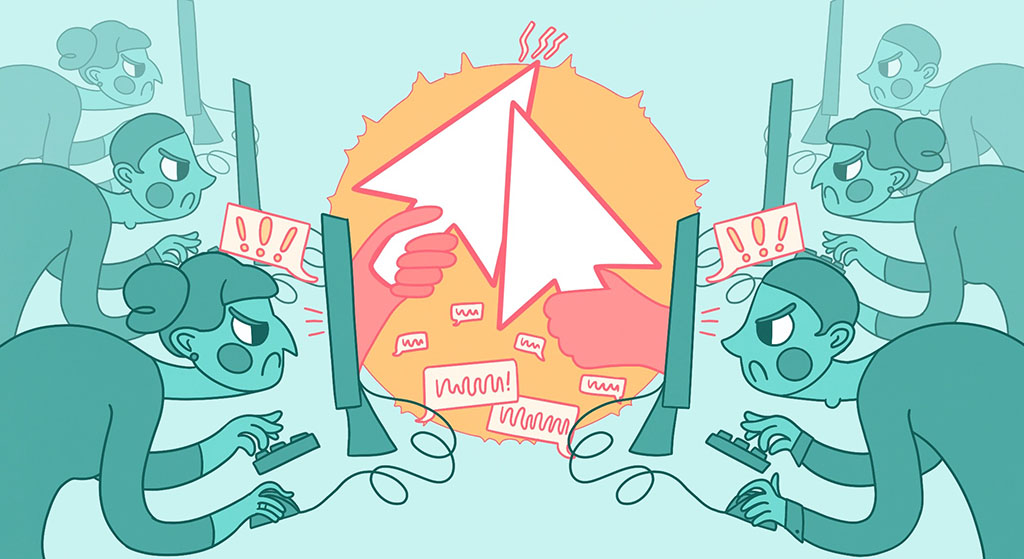Online discussions: why do they so often get out of hand?
Polarization, misunderstanding, and miscommunication. Is it still a good idea to have discussions online? ‘When an online conversation gets out of hand, I recommend continuing it face to face,’ says Assistant Professor Carla Anne Roos.

In your research, you explain that people are often extremely clear in online conversations. What do you mean by that?
‘When you communicate in text, you often try to write down clearly what you want to say. It is unusual to continuously write down ‘uhm,’ ‘ehh,’ or ‘I think,’ whereas you might do that in a face-to-face conversation. As a result, the medium limits your behavior to some extent.
‘In a ‘controversial’ face-to-face conversation, people tend to be more ambiguous because they don’t want to offend each other. In that case, opinions are expressed more cautiously. You use words like ‘uhm,’ ‘ehh,’ or ‘I think’ more quickly. In this way, interlocutors have a harmonious conversation. Not for nothing do people prefer to talk out a conflict face-to-face.’
Does an online discussion end in conflict faster than a normal conversation?
‘It does seem that way. Because participants in an online discussion send clear messages, there seems to be less understanding of each other’s opinions or situations.
‘Also, discussion partners often talk at cross-purposes and hardly respond to each other’s messages. As a result, people don’t feel heard, and they feel that polarization is more common in online discussions.
What exactly does it mean to feel heard?
‘Little has been written in the scientific literature about ‘feeling heard.’ Discovering what a term or concept means is difficult. After all, you have to turn something abstract into something concrete. To find out what it means anyway, I interviewed experts and practitioners. I also asked people to describe events in which they felt heard or not heard.
‘As a result, I found out that—to feel heard—you have to feel that you can say what you want to say. In addition, your interlocutor must pay attention to what you are saying, be respectful, and show empathy. And the notion must exist that your interlocutor and you understand each other.’
Is it still a good idea to have discussions online?
‘That depends on the purpose of a conversation. After all, not every interlocutor has antisocial intentions. An online medium influences the way someone communicates; if people keep that in mind, it can prevent misunderstandings.’
In discussions on social media, people often respond to others anonymously. To what extent does that play a role in online conflicts?
‘Anonymity can make people feel that they are less vulnerable. Yet it doesn’t always have to lead to conflict. Even people who send messages under their own names can come across as uninhibited or aggressive.

‘In my research, I had people chat with each other both anonymously (text only, ed.) and non-anonymously (they could see each other via a video link, ed.). What appeared to be the case? Participants in the study experienced no difference in communication behavior. Nor do they experience more disagreement in anonymous chats than in non-anonymous chats.’
To what extent does a culture influence the way online discussions take place?
‘That is a good question that I cannot answer with certainty. It’s an interesting topic that lends itself to follow-up research. In every culture, there are norms and values that can influence an online discussion. For example, when a Belgian and a Dutch person send each other messages, their different backgrounds could already cause a different conception of the same message.
‘This also applies to ‘micro-cultures.’ For example, in one group app it may be normal to send—by way of confirmation—’OK’. In other group apps, ‘OK’ is weird and comes across as if its sender is very angry. So the context of a conversation and the social norms and goals of a conversation partner are very important.
What would you advise people engaging in an online discussion?
‘My research shows that it is wise to express your point of view in a conversation not as fact but as an opinion. Words like ‘in my opinion’ or ‘maybe’ can already make a big difference. It offers space and openness to a discussion.
‘It is also noticeable that people often talk at cross-purposes online. It is important to respond to the other person’s point of view. Say, ‘Yes but,’ ‘No, that’s’ or ‘What you just said.’ By doing so, you respond and your interlocutor feels heard. Even if you disagree.
‘But when an online conversation gets out of hand, I still really recommend continuing the conversation face to face. In that case, you can better judge the tone of someone’s words, including his or her nonverbal communication.’
Translated by Language Center, Riet Bettonviel






